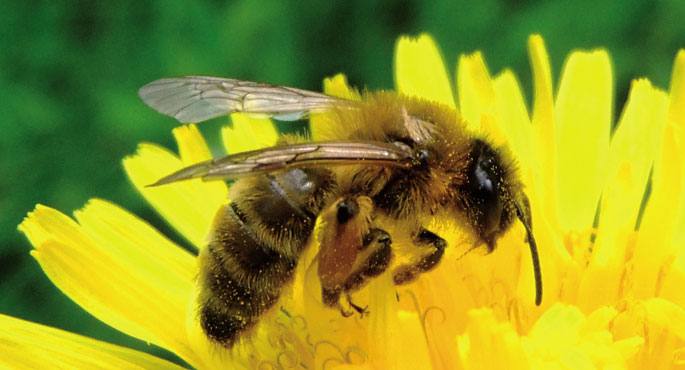Bees and insecticides: Lobby Workshop
- The European Commission (EC) has proposed to its Member States, for the time being unsuccessful, a strict limit on the use of certain neonicotinoid insecticides due to the serious damage they cause to their bees. In the meantime, multinationals producing these substances have struggled over the past year not to ban their products.

Neonicotinoids are an extremely widespread group of insecticides since the 1990s, but have recently been known by public opinion. In a report published last January, the European Food Safety Authority (EFSA) noted that there was a close link between the use of neonicotinoids and the disappearance of bees. As a result, the European Commission proposed to completely limit the use of three of these substances (imidacloprid, thiamethoxam, klothianidine). It should be borne in mind that the decrease in the number of bees is a serious environmental problem, as they play a very important role in the reproduction of plants. Incidentally, several states decided on their own long ago to completely reduce the use of the neonicotinoides.La Standing Committee on the Food Chain and Animal Health met on 14 and 15
March to discuss the European Commission’s proposal. Experts from the 27 countries that make up the European Union (EU) participated in the vote. The votes in favour of the proposal were higher than the votes against, but the majority was not sufficient to make the decision binding. The proposal will therefore be put to the vote in the Committee on Appeal in the coming weeks.
Industry campaign
The European Commission commissioned EFSA in April 2012 to study the incidence of these insecticides in bee populations, according to two studies published by the journal Science.Segone of the studies, worker bees that had had contact with small doses of thiamethoxam had high mortality rates for
this disease. The other study said that imidaclopride, also in small amounts, severely affects bumblebees, decreasing their reproductive capacity and causing the death of many queens.
Almost immediately, and in the absence of half a year to complete the EFSA report, the companies producing these neonicotinoid pesticides, Bayer (imadacloprid, klotiniadine) and Syngenta (thiamethoxam), began to vigorously develop the campaign for their products, in cooperation with ECPA. ECPA is the European lobby of producers of pesticidas.El CEO, which closely follows – and often denounces – the activity of Lobby, has summarised on its website the history of this campaign, showing the content of the letters sent to the European Commission by representatives of
the companies mentioned. What follows is a synthesis of that story.
The Commissioner received two letters in a very short time
In June, Bayer sent a letter to John Dall, European Commissioner for Health and Consumer and User Policy in the EU. The German multinational claimed that there was no scientific certainty that the disappearance of bees is directly related to neonicotinoids. According to Bayer, mass bee poisoning, which occurred in the past, has more than one reason, including the misuse of the agricultores.Cuatro days before Bayer, on
8 June, was Syngenta who moved his point of view to Commissioner Dalli. The letter was signed by the director of operations, Michael Mack, who did not miss the opportunity to remind Dalli that, “by chance”, two weeks earlier he had met with Barack Obama, François Hollande and other powerful authorities, and that at that meeting, among other things, Syngenta talked about the money he was going to spend on food security and particularly in Africa. In any case, the main objective of the letter was to despise the value of research papers published in Science.
... and a third party
The ECPA also chose the email to contact Dalli. The third letter received by the Commissioner in the same week is dated 13 June. Basically, the pesticide employers wanted to remind Dalli – and it was true – that the reduction in the bee population cannot be attributed to a single factor. As would be expected, the only suspect that was left out of the huge list of threats to which EPCA has referred were neonicotinoids.
Let us say, by the way, that shortly after, in October last year, John Dalli resigned after being accused of political corruption. A Swedish tobacco company was involved in the scandal.
No neonicotinoids, billions of losses
The next episode, following the chronology published by CEOE, came in November. By then, Dalli was no longer in office, but other people were in office. Syngenta called on the Commissioners for Agriculture and Research, by letter or otherwise, to review the issue of neonicotinoids and all EU agriculture ministers. In the letter, Syngenta stated that “if they oppose seed treatments such as Tiametoxam, farmers will start using insecticides that are more harmful to the environment”, resulting in losses of EUR 17 billion within five years. Syngenta claimed that this claim was based on an independent investigation, but did not disclose details about it.
After the visit of the scientists, the lawyers
Meanwhile, the two multinationals and EPCA were putting on the table scientific work that showed the risks of neonicotinoids and that showed their benefits. However, the report issued by EFSA in January this year proved, as has already been said, to be clearly contrary to the interests of the industry. Syngenta then appealed to the courts as a weapon of contragolpe.La the Swiss company had obtained the EFSA press release before its publication, which can
be deduced by the dates of the letters, and informed the Authority that it did not rule out filing a complaint against it if the contents of the communiqué were not changed. However, EFSA did not change a comma and CEOE says that since then Bayer and Syngenta are putting pressure on EU politicians. At the moment, the result of the first fight has been very favorable for the armers. Let us see what the second vote is about.

























